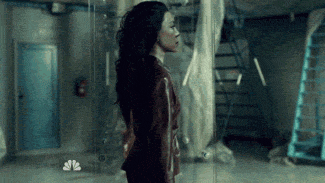In media involving physical performance, like theater and film, the human body becomes another weapon in the writer's storytelling arsenal. The body's posture and movements can speak volumes about a character before they even open their mouth; the way a character chooses to clothe and present their body gives hints about their background and values. There are also less conventional ways of using the figure to convey information - for example, distorting and perverting the expected human form to create an disarming language of visual metaphor. In other words, gore.

Shakespeare uses gore to great effect throughout Titus Andronicus, but nowhere is the meaning behind it more clear than with Lavinia's maiming. It's not a subtle technique; the characters who assault her go out of their way to explain to the audience why they've done what they've done to her. Her wounds harken back to mythology Shakespeare's audience would have been familiar with, with her tongue and hands cut away to render her mute and prevent her from identifying her attackers. In a grander sense, her injuries are the silencing of a female voice, particularly one that could be disruptive to a patriarchal status quo.
As Shakespeare's work was intended to be performed, not read, an actor would have portrayed Lavinia's disfigured body on stage. The characters around her make abundantly clear with their lines what the injuries she's suffered signify, but even before those lines are uttered, the audience would see her body maimed and understand the intent behind it. The visual would have been a powerful indicator of Lavinia's new position in the world.
Techniques for simulating gore have naturally improved since the days of the Globe, and visual media continue to convey story through carefully crafted viscera. A good recent example is NBC's series Hannibal, based on the tetralogy by Thomas Harris. The show centers around Will Graham, a profiler working for the FBI, and his friendship with his psychiatrist, the culturally ubiquitous Hannibal Lecter. While Dr. Lecter is naturally the story's main antagonist, Will encounters other violent tableaus in his work, each of which is a deliberate addition to a growing repertoire of thematic imagery that repeats throughout the show.

The scene above marks the first on-screen death of a recurring character - Beverly Katz, a forensic pathologist who works out what Dr. Lecter is up to, at the cost of her life. Dr. Lecter affords her the same 'consideration' he does all of his victims, aesthetically arranging her body for her coworkers to find. Though the tableau is incredibly morbid, it, like every other murder scene portrayed in the show, is designed by the showrunners to convey information about Beverly's character and the meaning of her death to the audience without relying on verbal cues.
Beverly had spent the story increasingly divided between loyalty to the FBI and loyalty to Will Graham, her friend, who encouraged her to begin an off-duty investigation of Dr. Lecter. The visual nod to that component of her story is fairly obvious; the part of her that sided with and supported Will, represented by the left half of her body, was ultimately the part that got her killed, and is the part dismantled by Dr. Lecter, while the right side of her body remains intact and undisturbed.
There are a number of other things at play in Beverly's tableau - a reference to her work in pathology, and, naturally, the aesthetic of raw meat - and it, too, makes a nod to contemporary art, specifically exhibits like Bodies, which display cross sections of human remains for the purpose of education. And much like Lavinia, Beverly is silenced by her maiming; the name of her attacker dies with her voice, and the characters who loved her are left with aimless anger.
Both Titus Andronicus and Hannibal are full of other examples of gore being used as a visual mode of storytelling, and both demonstrate the uncanny narrative power of deliberately distorted bodies.












